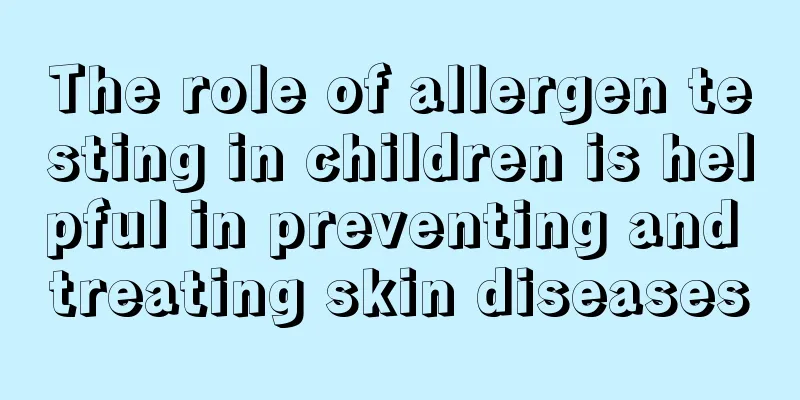The role of allergen testing in children is helpful in preventing and treating skin diseases

|
Children may suffer from various diseases as they grow up, so they are given various vaccines to prevent them. In addition, respiratory diseases are also common diseases in children, especially allergic respiratory infections, which require early allergen testing. In order to ensure the health of children, we must take as many precautions as possible to prevent problems before they occur. This is also the role of children's allergen testing. The role of children's allergen testing is mainly reflected in the fact that many skin diseases in clinical practice are related to allergens. Many children's allergic reactions worsen repeatedly because the allergens are not discovered in time. So don’t think that allergies are just a minor problem and ignore testing. Enzyme immunoassay is used to detect allergens quickly, accurately and painlessly. This method can be used for qualitative and quantitative detection of allergens (total IgE, total IgG, specific IgE, etc.) in patient serum or plasma. IVT is used to detect IgE-mediated immediate allergic reactions. Immediate allergic reactions have obvious seasonality, short onset time and high incidence. This test solves the difficulty that conventional skin tests are not suitable for detecting allergens during the attack period of patients with type I allergic reactions. FIgG is used to detect delayed allergic reactions. The reaction is mainly food related, that is, food intolerance. Symptoms may appear several days or a week after exposure to the allergen. These allergic reactions are often misdiagnosed due to delayed onset of symptoms, and clinically manifest as chronic symptoms in various systems. If the cause of the disease is unknown, recurring, and difficult to cure, it is recommended to check food IgG. Allergen screening tests are suitable for the following groups of people: patients with unknown allergies, eczema, urticaria, allergic rhinitis, asthma, psoriasis, etc. should undergo allergen testing, which will be of great help in preventing and treating diseases. The test kits currently used in hospitals for allergen testing can be roughly divided into the following types: 1. Screening test for inhaled allergens; 2. Screening test for ingested allergens; 3. Classification test for inhaled allergens (this test kit can detect the specific inhaled substances that cause allergic reactions, such as dust mites, pollen, etc.); 4. Classification test for ingested allergens (it can also detect the specific foods that cause allergies). In fact, the role of children's allergen testing is to promptly detect possible allergies in children, and then promptly detect allergens and take effective measures to avoid or treat them. It is very necessary in the healthy growth of children, especially some allergies that may occur in the respiratory tract, which cannot be ignored. For the better growth of children, it is recommended that parents have their children tested for allergens. |
<<: What is the difference between childhood loneliness and autism?
>>: What are the hidden dangers of children's shoes? How to choose them safely?
Recommend
What should I do if my child doesn't cough during the day but coughs at night?
Sometimes it is very worrying for adults when chi...
What is the normal height for a 14 year old girl?
Girls' physical development starts about thre...
How to treat acne on boys' faces
Acne on boys' faces has a great impact on our...
What causes ADHD in children?
Children are lively and cute and are likable. Peo...
Why is the stool thick in newborns?
New parents always lack certain experience in tak...
Why does my child have itchy red bumps all over his body?
If a child develops red bumps and they are very i...
Dangers of using antibiotics in newborns
We all know that many children may have some dise...
What causes herpes on the neck?
Most people do not have enough knowledge about he...
Three major causes of cerebral palsy in children
Cerebral palsy in children is currently a common ...
What are the physical training equipment for children?
Every one of us as parents hopes that our childre...
What causes favism in children?
Favism is a hereditary disease in children. If pa...
Why does my child keep farting?
Some parents reported that their 15-year-old chil...
What medicine is good for children's nosebleeds? Finding the cause is the most important
Sometimes children will have nosebleeds for no re...
What to do if your child has white spots on his tongue
Whether children can grow up healthily is an issu...
Basic principles of balanced nutrition for babies
For babies, daily diet is very important, and it ...









